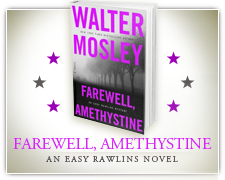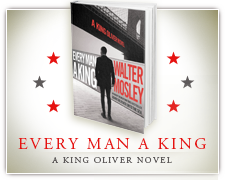Walter Mosley On The Stories Of LA Told Through Easy Rawlins
In 1990, Walter Mosley first told the story of black postwar LA through Easy Rawlins, an Army vet turned private eye. It became Mosley’s best-known series. He discusses Easy’s creation and journey.
RENEE MONTAGNE, HOST:
A quarter of a century ago, Walter Mosley introduced the character Easy Rawlins, an Army vet turned private eye, to tell the story of black postwar Los Angeles. Today, Easy Rawlins is a literary icon. Mosley is one of America’s best-known writers. His newest book in the series is called “Charcoal Joe.” Karen Grigsby Bates from our Code Switch team talked with Mosley about Easy’s creation and journey.
KAREN GRIGSBY BATES, BYLINE: Ask Walter Mosley what he does, and he’ll say simply, I’m a writer, and he’s written a lot nolvadex online canada.
WALTER MOSLEY: I’ve published 52 books and maybe 30 short stories and another 30 or 40 articles.
BATES: Most writers specialize in one or two types of books, but Mosley refuses to be constrained. He’s written mysteries, science fiction, erotica and young adult fiction, plays and opinion pieces and essays. He’s even penned a slim book that instructs would-be fiction writers on how to get started. And it’s not always about the money.
MOSLEY: I have all these things. I’m continually writing them and, you know, people say, well, I can’t sell that stuff. Well, that’s OK. We’ll just publish it. Don’t give me any advance and we’ll see where it goes, you know, because the idea of writing – if you want to get rich, you go into real estate.
BATES: But it’s his Easy Rawlins series that made Walter Mosley famous.
(SOUNDBITE OF SONG, “WEST SIDE BABY”)
T-BONE WALKER: (Singing) I’ve got a west side baby. She lives way…
BATES: The Rawlins series begins in 1948 when Los Angeles is adjusting to its new population of black migrants from the South who came to work in war-related industries. Those experiences are vividly portrayed in the novel “Devil In A Blue Dress” in 1990 and later in the 1995 movie version. In this scene, Easy, played by Denzel Washington, has just been let go from his job at one of the city’s many airline factories. He’s not happy about it, and he tries to get his boss to reconsider.
(SOUNDBITE OF FILM, “DEVIL IN A BLUE DRESS”)
DENZEL WASHINGTON: (As Ezekiel Easy Rawlins) I need a house to live. I need to put clothes on my back, Mr. Giacomo. I need the job.
STEVE RANDAZZO: (As Benny Giacomo) I’m sorry, fella. I got to get back to work.
WASHINGTON: (As Ezekiel Easy Rawlins) My name’s not fella.
RANDAZZO: (As Benny Giacomo) Huh?
WASHINGTON: (As Ezekiel Easy Rawlins) My name’s not fella. My name is Ezekiel Rawlins.
BATES: Mosley’s tale of love, political corruption and racial intrigue became a bestseller. Bill Clinton famously became one of his biggest fans. And the series has brought him honors. Mosley was chosen as the 2016 grand master of the Mystery Writers of America, their highest honor. The Lifetime Achievement Award puts him in the company of past grand masters like John le Carre, Ross Macdonald and Agatha Christie. David L. Ulin, former book critic for the Los Angeles Times, says the Rawlins novels are fine mysteries but Mosley goes beyond the genre.
DAVID ULIN: I think he’s operating in the tradition of writers like Balzac or Dickens who wrote sort of broad social novels with large casts of characters moving across a variety of classes and social spheres and also in which the city, Paris or London or in Walter’s case Los Angeles, becomes a character in its own right.
BATES: In the Easy novels, the city is important. The people, even more so. Mosley said he had a very specific objective. He wanted to write about the lives he saw around him growing up in LA. It was part passion, part mission.
MOSLEY: One of the things that I understood is that you don’t exist unless you’re in the literature, and that doesn’t include history books. And the black people in California, they just weren’t remembered. They – nobody was telling their stories.
BATES: Fortunately, there were stories aplenty. As a boy, Mosley listened to his father and his father’s friends talk over backyard beers about politics, music and finessing the city’s notoriously racist police. Those stories helped shape the Easy novels and enabled Mosley to paint a vivid portrait of LA’s evolving black community. Critic David Ulin says the book spanned a critical period in LA’s evolution.
ULIN: Many, many things changed from ’48 to ’68 in Los Angeles and particularly in terms of race relations, racial culture, racial divisions, et cetera, which are at the essence of what the Rawlins books are tracing.
BATES: The novels move from the pre-civil rights era to the late ’60s, when Easy has a steady day job but still occupies much of his time seeking answers for people who can’t or won’t go to the police. By “Little Scarlet,” the ninth book, Easy has become a private eye and the Watts riots have reduced his old neighborhood to ash. But after “Blonde Faith,” the eleventh book, Mosley was stuck. The novel ended with Easy driving off a Malibu cliff. Fans were devastated. Mosley didn’t see a way around it.
MOSLEY: I had no future for Easy, and so I decided I was going to stop writing him. I didn’t think he was really dead, but I did think I was going to stop writing him.
BATES: And he did. For six years, Easy was just gone. Then Walter Mosley had an epiphany.
MOSLEY: My father and his family’s story had kind of come to an end at that point for me. And it was now my story. And if Easy was going to go on, I would have to put down these other people’s interpretations of the world and use my own.
BATES: Which is exactly what he did.
(SOUNDBITE OF MUSIC)
BATES: In 2013, Easy returns in “Little Green,” a story about a black teen who disappears into a hippie commune after a bad trip. The setting was the legendary Sunset Strip. It was a time when disaffected youth, activists, runaways and dropouts turned Sunset Boulevard into a roiling scene each night. Mosley saw it all with his own eager teenaged eyes.
MOSLEY: Ten thousand hippies every night are marching barefoot up and down the street, getting high, talking about new philosophies and religions and notions and trying to create a new culture as they say, a counterculture.
(SOUNDBITE OF SONG, “PURPLE HAZE”)
JIMI HENDRIX: (Singing) Excuse me while I kiss the sky.
BATES: In this book, “Charcoal Joe,” Easy has settled into life. He’s the co-owner of a detective agency. His two adopted children are doing well, and he has a fiance, a beautiful flight attendant. But when a black Stanford graduate student goes missing, the kid’s uncle, a feared gangster known as Charcoal Joe, asks Easy for help. Of course complications ensue. Part of Easy’s attraction is his humanity. Old school private eyes did what they wanted, consequences be damned. Mosley says Easy doesn’t have that option.
MOSLEY: You arrest, you know, Sam Spade and he just says, well, you know, I’ll just stay in jail. I don’t have to answer you. But if you have a child at home that needs to be fed and protected, you have to figure a way to answer that policeman’s question and also get yourself out of jail.
BATES: The next Easy installment will probably focus on the aftermath of the Vietnam War. It shouldn’t be long. Mosley’s quick and prolific.
MOSLEY: I only write three hours a day, but I write three hours every day, 365 days a year. I just, like, write and write and write.
BATES: Which makes Walter Mosley’s legion of fans happy because now they can just read and read and read. Karen Grigsby Bates, NPR News.
(via npr.org)





